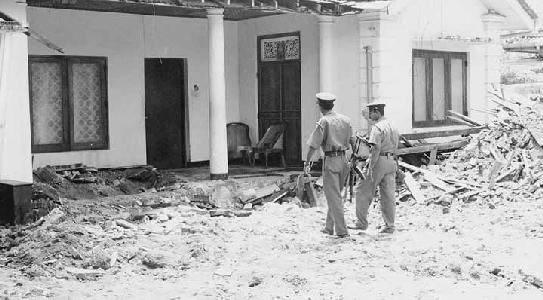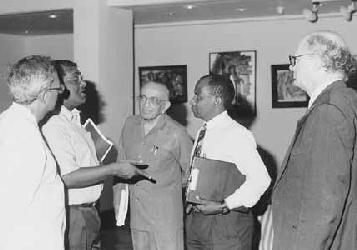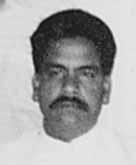


![]()
The bulldozing of a Wellawatte house belonging to a suspect in the Ratmalana airport bomb plot has outraged Tamil party leaders who accused the police of criminal action and slammed the PA regime as a bulldozing government.
Police and security forces on Thursday used bulldozers to dig up the garden of the suspect’s house and said the portico of the house, windows and other fittings were damaged in the process. But others say it was similar to the notorious Israeli tactic of bulldozing houses of suspects.
The strongest reaction came from TULF parliamentary group leader Joseph Pararajasingham who charged that the custodians of the law were taking the law into their hands while a government which promised democracy and human rights was turning a blind eye.

The House "damaged in the process" Lakshman
He said such horrible bulldozing tactics had been used earlier also to demolish the houses of two other Tamil suspects at Kotahena and Bambalapitiya.
PLOTE leader Dharmalingam Siddharthan in an equally tough response accused the security forces of imposing a law of the jungle by punishing suspects without a trial.
EROS leader K. Sudhakaran said the demolition of the house was a blatant act of anarchy and provided proof that Tamils were being treated as second or third class citizens.
TELO spokesman N. Srikantha said the demolition was extra-judicial punishment and an act of state terrorism. He said if such things were happening in Colombo one could imagine the horror being let loose in the north-east. The government had appointed presidential commissions to probe human rights violations under former UNP regimes but rights were being demolished now and everyone who respected freedom and human dignity should speak out against such atrocities.
ACTC leader Kumar Ponnambalam in a characteristically fiery outburst described the PA regime as a bulldozer government. He said several such acts of bulldozing had taken place in the north.
But no profit motive say top docs.
Sri Lanka’s first proposed private blood bank has run into opposition from a section of medical professionals, but the group responsible for the project said they are determined to go ahead with the plan citing several benefits of the bank.
Doctors who do not wish to be named have cited problems of screening blood and claim that the group responsible for the proposed private blood bank was trying to make use of the licence for kidney transplants which could turn into an enterprise similar to what is taking place in India.
But top Hematologist Dr. Chandima de Mel, a key person behind the project denied the allegations and pointed out the importance of an additional blood bank saying that, most of the private hospitals suffer an acute shortage of blood and related components.
‘The Sunday Times’ learns that many patients do not get the required amount of blood even at emergency situations forcing them to carry urgent appeals for particular blood groups which are not freely available.
Dr. De Mel said the blood bank to be set up would ease this situation to a great extent. “The blood demand for a day could be as high as 600 to 700 pints, so we have to be fully equipped to meet this situation,” he said.
However, quite contrary to this a spokesman for the state owned, Central Blood Transfusion Centre told ‘The Sunday Times’ that at present there was no shortage in the daily blood requirements.
Professor Lal Chandrasena, who is also supporting the concept of an additional blood bank assured it would be a non-profit, enterprise entirely sponsored by the Rotary International. The Colombo Municipal Council had already allocated a building for this purpose at Maligakande, he said.
Professor Chandrasena said Rotary has contributed a massive US$ 400,000 (about Rs. 24 million) towards this project. Once fitted up, this blood transfusion centre could supply at least 1000 pints a day, he claimed.
Dr. De Mel said the campaign to obtain blood would be widespread. Rotary volunteers will visit various work places and institutions seeking blood from donors.
However the hospitals when purchasing the blood, would be required to pay a minimal rate for the packaging, and other tests the donor would have to undergo. The blood itself would be issued free of charge he said.
The GMOA reacting to the idea of setting up a new blood bank, on Thursday made representations to the Minister of Health Nimal Siripala de Silva.
A spokesman for the GMOA told ‘The Sunday Times’ that the National Blood Transfusion Centre never suffered a shortage of blood and that they always supplied the required amounts to patients at private hospitals.
“But the private hospitals have often created an artificial shortage of blood. If more blood is needed the government could always advertise calling” for blood the spokesman said.
He recalled certain periods when large number of donors lined up at the National Blood Bank, and blood packs were in abundance.
“So therefore if at all there is a shortage, the National Blood Bank could simply expand their programme,” he added.
The spokesman referring to drug addicts said that many who would want to make a fast buck, would even stoop to the level of selling their blood, and there is the chance of dangerous diseases spreading .
He added that in many private hospitals the use of blood is abused. “The government hospitals approve blood to the patient according to his needs only and not more than that to avoid waste,” he said.
The GMOA had suggested to the Health Minister that the funds made available to set up a new blood bank should be channeled to development of the national Blood Transfusion Centre.
Sociologists said yesterday that Sri Lankans were committing suicide at an alarming rate of at least 27 a day.
“It has been revealed that since the 1960s around 10,000 people commit suicide annually in Sri Lanka,” Karunatissa Athukorale, a senior sociology lecturer at the Peradeniya University told a workshop in Colombo.
Experts say poverty is the main reason for suicides in the country of 18 million. But residents have also had to cope with the stress of a bloody separatist rebellion by Tamil rebels since 1983 that has claimed tens of thousands of live.
The most common method of suicide is to ingesting insecticide, which is freely available.
“The rate of suicides in the country has increased to alarming proportions and it has become a major social problem,” Mr. Athukorale said at the workshop, titled “Prevention of suicides and social integration.” He said a recent survey he conducted showed that 55 out of every 100,000 Sri Lankans took their own lives each year.
The sociologist estimated that more than 175,000 people have killed themselves since 1950. “More than 75 percent of the victims are males,” Athukorale said. President Chandrika Kumaratunga last year appointed a committee to study the problem as Sri Lanka is believed to have one of the the highest suicide rates in the world.
The government has also requested the state-owned media to refrain from publishing stories about suicides, fearing it could encourage more deaths. - Reuter
Vanik Incorporation has placed two representatives on the Board of Pan Asia Bank and taken the post of chairman paving the way to gain effective control of the commercial bank.
“We were invited by the directors to join the board,” Vanik Chief Justin Meegoda told The Sunday Times.
Vanik has been on an aggressive acquisition trail for some time. A few months ago it made a bid for Forbes Ceylon Ltd.
Last weekVanik was also given the go ahead by the Controller of Exchange to acquire Forbes, which is set to be the biggest ever takeover in Sri Lanka.
Earlier Vanik reached agreement with principal shareholders Forbes to purchase their shares in the event of the deal getting the nod from authorities.
At the Annual General Meeting of Pan Asia Bank Friday, several directors, including Chairman Lakshman Watawala withdrew their consent to be re-elected as directors, effectively stepping down from their positions. Vanik Chairman Dr. W. M. Tillekeratne and Mr. Meegoda then joined the board.Dr. Tilleke-ratne has been appointed Chairman and H. Omar (Phoenix group) has been appointed Deputy Chairman. Just prior to the A G M several directors had also quit, reportedly because the bank had an unusually large board of 13 members.
Other directors on the new board include Ranjith Fernando, Sydney Jayasinghe, A. W. Hathiramani, Mukthar Marikkar and Rienzie Pintoe.
Mr. Watawala is believed to have been offered a consultancy position at the bank.
The Malaysian investment group TA Securities which has a big stake in National Enterprise Bank are also shareholders of Pan Asia Bank.
Mr. Watawala went to court earlier this year, when directors removed him from the board allegedly after he queried some of the loans given to them.
According to the annual report released recently the Central Bank has informed Pan Asia that it is not satisfied with the shareholding of the bank. The bank in turn has sought clarification from Central Bank.
The accounts showed that the bank had made a profit of Rs 20 mn for the year ended December 31, 1996.
Analysts say the fact that Vanik representatives had been invited to the board has indicated that there was substantial shareholder backing for the move, even if Vanik itself were prevented from owning a controlling stake in the bank.
ARCASIA, the Architects Regional Council of Asia, meeting headed by Surath Wickramasinghe of Sri Lanka ended yesterday in Tokyo.
ARKASIA consists of the Presidents of fifteen National Institutes of Architects — Bangladesh, China, Hongkong, India, Indonesia, Japan, South Korea, Macau, Malaysia, Mongolia, Pakistan, Philippines, Singapore, Sri Lanka and Thailand.
Vietnam, Nepal and Brunei are to join ARCASIA within the next two years.
The Council meets annually to celebrate and give collective direction and representation to matters that affect the architectural profession in the region.
The Sri Lankan delegation includes National Institute of Architects members Prof .Lal Balasuriya, Lalith de Siva and Prof. Lakshman Alwis, V.N.C. Gunasekara, Mihindu Keethiratne, and Rehan Tillekaratne.
UNP’s reorganisation campaign in the Matale district led by Opposition Leader Ranil Wickremesinghe was marred when gangs pulled down decorations, burnt tyres and threatened party supporters on Friday, sources said.
Some of the flags and decorations were also burnt in the Matale town while a jeep belonging to the Central Province Minister Wasantha Aluvihare was badly damaged when it was attacked by mobs believed to be supporters of the PA, the UNP sources said.
Mr. Aluvihare lodged a complaint with the Matale Police, but no arrests had been made until Saturday noon.
Mr. Wickremesinghe on Friday met party members and local government members representing his party in the Dambulla area.
Nearly 4000 members of the party took part in the campaign.
A system introduced by Education Ministry to evaluate the progress of staff in Government schools has left students idle, with teachers filling up ‘evaluation books’ during class-room hours in an effort to get promotions and salary increments, educationists have said.
There is also speculation that this system might favour teachers who are close to the principals and thus lead to favouritism. Visakha Vidyalaya Principal M. N. Edussuriya said the teacher assessment system was welcome as it gave motivation and work satisfaction to the staff.
She said that at her school teachers were permitted to fill in these books only during their free periods. However, she pointed out that this evaluation should be done in an impartial manner. Furthermore the manner in which this performance was evaluated might vary between schools.
Anula Balika Maha Vidyalaya Principal N.G.W.I .Jinasena said the system helped improve the quality of teachers.”It also helps the teachers to be organised, and is a good move by the Education Ministry”, she said.
According to reports teachers of one Colombo school had spent several hours filling up these evaluation books during teaching periods with the students being asked to merely go to the playground.
National Teachers Union General Secretary Poulier Goonawardena who welcomed this system said, it would come into effect fully from next year.

A three-member mission from the Centre for the Independence of Judges and Lawyers (CIJL), an institution set up by the International Commission of Jurists (ICJ), is presently in Sri Lanka to inquire into and report on the Independence of the Judiciary in Sri Lanka. Here members of the delegation, former Chief Justice of India P.N. Bhagwati, Phineas M. Jojapelo of the Judicial Services Commission and the Law Commission of South Africa and Lord (William) Goodhart of the Executive, Committee of the ICJ are seen in conversation with President’s Counsel Desmond Fernando, an ex-President of the Bar Association of Sri Lanka and Mr. Hemantha Warnakulasuriya, Chairman of the Legal Aid Commission.
Jaffna Diocese of the Church of South India (JDCSI) has called on world Christian organisations to press the Sri Lankan government to ensure a complete investigation into the alleged murder of their priest Rev. I. Arulpalan of Konavil Church in Kilinochchi district while in state custody.
JDCSI has made the request to the World Council of Churches - Geneva, Christian Conference of Asia - Hong Kong, Unity Church of Australia-Melbourne, United Church Board for World Ministries - New York, Christian Aid - UK, Church of South India - Madras, Canadian Methodist Church - Toronto and Puttney Methodist Church - England as well as National Christian Council of Sri Lanka.
The executive members of JDCSI recently passed a resolution unanimously that the death of Rev. Arulpalan be conveyed to President Chandrika Bandaranaike Kumaratunga and appeal to her to ensure a complete investigation.

Rev. Arulpalan
Pointing out that the sudden death of Rev. Arulpalan has created a vacuum in the rehabilitation programme of the church in the conflict areas in the North , the JDCSI has requested the General Secretary of National Christian Council Dr Rienze Perera to take necessary action to inform the other heads of the churches about this incident.
JDCSI has appealed to the President to ensure that a complete investigation into the death of this priest is initiated and action taken against the offenders.
It stated that Rev. Arulpalan was taken into custody on August 25 by the Sri Lankan Army while he was visiting the church farm and this was confirmed by one of the priests serving in the same area.
It added that when they contacted the Defence Ministry on August 28 regarding this incident they informed that it would be a routine check. “We infomed the ICRC. However, to our great grief and dismay, we received a message from the ICRC on the 12th that the dead body of Rev. Arulpalan was found at Puthumurippu on September 9,” it said.
“At a time when the President’s efforts to bring peace and ensure that civilian life is protected, incidents of this nature especially the killing of a priest is a deplorable act, that no one will condone,” it said.
The GMOA has again showed its displeasure over the two-member committee appointed by President Chandrika Kumaratunga to investigate irregularities at the State Pharmaceutical Corporation.
In a letter to the President the GMOA has mentioned that notice of the appointment of this committee, had been made in the ‘most unprofessional manner’.
SPC Chairman Professor Colvin Goonaratne who stood before two committees which investigated his involvement in the import of an inferior quality triple vaccine, will now stand before a third committee at his request.
The GMOA who were in favour of the earlier committee reports, which recommended action against Prof. Goonaratne, demanded that any further inquiries be held in the open, in the presence of media and other parties concerned. The GMOA also wants its representatives, including a lawyer, be allowed to lead evidence or cross-examine any witnesses or officials summoned by the committee.
Chief Justice G. P. S. de Silva left for Doha, Qatar yesterday to attend the World Jurists Conference but no acting appointment has been made, legal sources said.
The Chief Justice is expected to return to the country on Saturday. Justice Mark Fernando is the next senior most judge of the Supreme court.
Meanwhile, the Bar Association yesterday expressed its “concern” at the delay in the appointment of a judge to the Supreme Court consequent to the retirement of Justice P. Ramanathan at the end of August, which was known months ahead.
The executive Committee of the Association in a news release said that it “trusts the appointment would be duly made without further delay.”
The Agriculture Ministry has launched a major drive to transform Sri Lanka into a self sufficient nation in food products with a US$ 300 million fund from China.
“By 2005, Sri Lanka is not only hoping to become self sufficient in grains, vegetables, fruits and other agriculture products, and but also export the excess products” said Minister D. M. Jayaratne after a meeting with agro officials and specialists.
The Chairman Sri Lanka Petroleum Corporation has remained silent over the queries posed to him by the Auditor General’s Department regarding the recruitment of 1026 employees to the corporation.
The queries were raised in a letter sent to the Chairman over three months ago, on the errant procedure followed in the 1026 recruitments. The Auditor General had written to the Chairman Anil. J. Obeysekera on May 27 asking for the recruitment procedure.
The department said that in the absence of a reply from the corporation, he was unable to proceed with the subject any further. Irregularities include age limits and educational qualifications. It is said that a recruit appointed is a pensioner.
Continue to the News/Comment page 2
![]()
| HOME PAGE | FRONT PAGE | EDITORIAL/OPINION | PLUS | TIMESPORTS
Please send your comments and suggestions on this web site to
info@suntimes.is.lk or to
webmaster@infolabs.is.lk